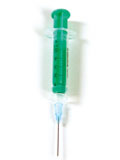Pharmacies and Medicines

Medicines can only be bought in Germany at pharmacies ("Apotheken"). Most medicines require a prescription from a doctor. The prescription drugs needed are written down on a prescription ("Rezept") by the doctor and taken to the pharmacy. The prescription is taken to the pharmacy by the patient and the pharmacist issues the medicines. A nominal fee is paid for each drug depending on the cost of each medicine. Low-income households are exempt from paying these fees. The exemption can be obtained from the health insurer. Some painkillers, such as headache tablets, are available at pharmacies without a prescription.
Private patients (see chapter ![]() Health Insurance) must pay the full price of the medicines and then claim this money back from their insurer.
Health Insurance) must pay the full price of the medicines and then claim this money back from their insurer.
There is always at least one pharmacy open in every area day and night. This is called the "Notdienst". In rural communities people may have to travel to the nearest village or town. The addresses of the pharmacies that are open on specific days are listed in local newspapers under "Apotheken-Notdienst". All pharmacies always have a sign to tell customers which pharmacy is open on which day.
